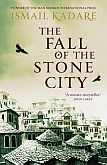There is a place where the literary world and the gaming industry intersect. It’s the Nobel Prizes. Once again this year you can place bets on who is going to win the Literature Prize.
Once again, Albanian author Ismail Kadare is considered a contender. As of this review, he’s one of three authors listed at 14-1 odds with four authors ahead of them. Last year, he wasn’t in the top 10. That has no bearing on whether Kadare will win this year but I am fairly certain he ultimately will be a Nobel laureate.
Kadare’s books reflect his country and are imbued with Albanian myths and metaphors. It’s a country that has seemed to struggle, not always of its own doing, in moving from legend and history to modernity and from Communism to an open market. Albania is not only the setting, it is a major part of the context. His latest work to be translated into English, The Fall of the Stone City, continues the pattern.
 The book is set in his native town of Gjirokastër in southern Albania, coincidentally the birthplace of Enver Hoxha, the committed Marxist-Leninist dictator of the country from 1944 until his death in 1985. The medieval city, which Kadare describes as having “a reputation for arrogance,” is populated with large stone houses, although its skyline, as it is, is dominated by a prison built on top of a medieval castle at the highest point in the city. These features also play a role in The Fall of the Stone City.
The book is set in his native town of Gjirokastër in southern Albania, coincidentally the birthplace of Enver Hoxha, the committed Marxist-Leninist dictator of the country from 1944 until his death in 1985. The medieval city, which Kadare describes as having “a reputation for arrogance,” is populated with large stone houses, although its skyline, as it is, is dominated by a prison built on top of a medieval castle at the highest point in the city. These features also play a role in The Fall of the Stone City.
Kadare, the winner of the inaugural Man Booker International Prize in 2005, breaks this tale into essentially three parts. In the first, the Nazis occupy the city following Italy’s surrender in 1943. The leader of the Nazi tank division is Colonel von Schwabe, a friend of Dr. Gurameto, one of the city’s leading physicians, who attended school in Munich. The physician is known locally as “Big Dr. Gurameto” because another physician in town also is named Gurameto. There seems to be an longstanding and ongoing fascination among city residents with assessing whether “Big” or “Little” Dr. Gurameto has the most prestige at any particular time. Because a small group of partisans attacks the vanguard of the tank division before it enters the city, the Germans seize 80 hostages upon assuming control of the city. Still, Big Dr. Gurameto hosts a dinner party that night for von Schwabe and other German officers. Shrouded in mystery and couched in myth, over the course of the long night all the hostages are released.
The second part of the story is transitional, addressing the transformation of life in the city as the Communist partisans take charge of the country following the German withdrawal in 1944. It traces the changes in and effect on the city of the Hoxha regime until both Big and Little Dr. Gurameto are arrested in 1953. Kadare’s account of the impact of Communism on the town is more subtle and somewhat indirect. For example, it illustrates the contrast between past and present by looking at the effect of party programs and discipline, and even being called “Comrade”, on the “ladies” of the city, with the term being used in the medieval sense of superior social rank.
The final part focuses on the arrest and interrogation of the two physicians. They are taken to the worst part of the prison, known for torture. They are caught up in the reverberations of the so-called Doctors’ Plot against Stalin. Here, though, Kadare presents an unexpected twist, one which leads Big Dr. Guerameto to being interrogated not only by two members of the Albanian secret police but also investigators from East Germany and Moscow. All of them are intent on learning what really happened at the dinner party in 1943. And even though he wasn’t involved with the events of that night, Little Dr. Guerameto is dragged along, perhaps representing an Albania that is caught up in a Nazi occupation succeeded by an extremely repressive native totalitarian regime.
Translated by John Hodgson, the book reflects the plight of Albania during these times. First, it is the Nazis who are prepared to shoot hostages. Ten years later, Albanian officials stand ready and willing to torture their own countrymen in pursuit of plots that likely never existed. The book gives both the sense and essence of a totalitarian state in language that, while straightforward, is literary and often allegorical. The Fall of the Stone City is a strong addition to Kadare’s body of translated work and which further demonstrates that he is deserving of wider acclaim and readership.
As always, when they ran out of arguments they reached for their guns. As they had more bullets than words there was little chance of an end to the quarrel.
Ismail Kadare, The Fall of the Stone City







